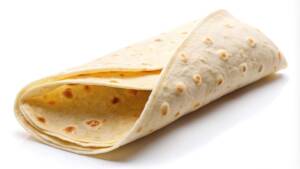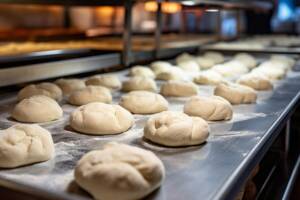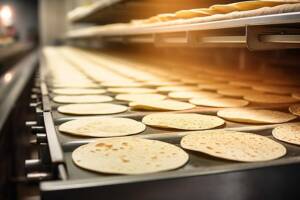
Tortillas are a type of flatbread that originated in Mexican cuisine and has gained worldwide fame thanks to its versatility in many dishes such as tacos, fajitas, and burritos.
With the increasing demand for Mexican cuisine in global markets, establishing a tortilla bread factory has become an attractive investment opportunity for entrepreneurs. In this article, we will discuss everything related to this industry, from raw materials to production stages, as well as how to succeed in this field
Raw materials used in the manufacture of tortillas
To achieve success in establishing a tortilla bread factory, you must first identify the basic raw materials required. The components of tortillas vary depending on their type (white, wheat, or corn), but there are some basic ingredients that go into most recipes.
Flour
Corn flour: Used to produce traditional tortillas made from corn. Corn flour gives the bread a distinctive flavor and is an essential ingredient in traditional dishes.
Wheat flour: Used to make soft and flexible tortillas that can be easily folded. This type of bread is very popular outside of Mexico.
Water and Salt
Water is the main ingredient that helps form the dough, while salt improves the flavor and stabilizes the dough.
Oil or Fat
Oil or fat is added to improve the softness of the bread and to extend its shelf life
Tortilla Bread Production Stages in Factories
Establishing a tortilla bread factory requires complete knowledge of the production stages to ensure the quality of the final product. The manufacturing process can be divided into several basic stages:
1-Preparing the dough
At this stage, the basic ingredients (flour, water, salt, oil) are mixed in an industrial mixer until a soft and elastic dough is formed. The ratio of water to flour must be accurate to achieve the ideal dough texture.
2-Shaping the dough
After preparing the dough, comes the stage of shaping it into thin circles using specialized machines that flatten the dough and cut it into the ideal shape for tortilla bread.
3-Cooking
Tortilla bread is cooked on a hot plate (or heat press) to ensure it is cooked evenly. It requires precise temperatures to achieve the right color and texture.
4-Cooling and packaging
After cooking, the tortilla bread is cooled before being packaged. This ensures that the quality and flavor are maintained for a longer period
Requirements to establishing a tortilla bread factory
1-Location and Equipment
Choosing the right location is an essential part of establishing a tortilla bread factory. It is preferable for the factory to be close to markets and suppliers to reduce transportation costs. In addition, you need specialized equipment such as industrial mixers, forming machines, and cooking plates.
2-Health Licenses
You must adhere to the health standards required to establishing a tortilla bread factory. These licenses ensure that the products comply with local and international food safety standards.
3-Trained Labor
You need a team trained to operate the machines and produce high-quality tortilla bread. The skill of monitoring processes and reducing errors makes a big difference in the success of the factory.
Challenges of establishing a tortilla bread factory
Like any other industry, establishing a tortilla bread factory faces some challenges that must be considered and planned to overcome.
Maintaining Quality
A tortilla bread factory must adhere to high quality standards to ensure that the products remain fresh and desirable to consumers. This requires constant monitoring of raw materials and the production process.
Market Competitiveness
As the demand for tortilla bread increases, so does the competition in the market. The factory must have a high-quality product and a competitive price to attract customers.
Cost Management
It is essential to monitor production costs and avoid waste of raw materials and energy. Improving process efficiency will help achieve higher profits.
Benefits of establishing a Tortilla Bread Factory
Despite the challenges, starting a tortilla bread factory can be a very profitable venture due to the growing demand for this product. The most prominent benefits are:
A wide market
Tortilla bread is not limited to Mexican restaurants only, but is included in many other recipes, making it a diverse and in-demand product.
Availability of raw materials
Most of the ingredients of tortilla bread are widely available, making it easy to secure a steady supply for the factory.
Scalability
Once successful in the local market, the factory can expand to new markets or offer innovative products such as tortillas with various flavors or healthy products such as gluten-free tortillas
Methods for Maintaining Tortilla Bread Quality
To ensure the continuity of quality in establishing a tortilla bread factory, a number of basic factors must be focused on that contribute to maintaining the required level of quality:
Control of humidity
Humidity is an important factor that affects the texture and flavor of tortilla bread. Humidity levels must be monitored during the production process, as low humidity may lead to dryness and cracking of the bread, while high humidity may reduce the shelf life.
Use of natural preservatives
Natural preservatives such as citric acid or vinegar can be used to increase the shelf life of tortilla bread without affecting its quality. This allows the factory to produce larger quantities without having to worry about the product spoiling quickly.
Monitoring storage temperature
After the production process, tortilla bread should be stored in a cool, dry environment. Proper storage can extend the life of the product and maintain its freshness and flavor. The factory must also ensure that the temperatures in the storage area are consistent and not subject to fluctuations that may affect the product.
Innovation in the Tortilla Industry
With the increasing demand for innovative and healthy products, a tortilla manufacturer can achieve success by offering new and different products. Innovation in this industry can include:
Production of gluten-free tortillas
With the increasing demand for gluten-free products due to the requirements of various diets and food sensitivities, a tortilla manufacturer can provide healthy and gluten-free options. Using corn flour or gluten-free wheat alternatives is an ideal option.
Production of high-protein tortillas
Protein-rich food products are a recent trend in the food industry, especially among athletes and people who follow a healthy diet. Adding protein sources to tortillas, such as pea protein or soy protein, can be an innovative step to attract a new segment of consumers.
Innovative Flavors
Offering tortillas with different flavors such as spices, herbs, or cheese is an additional option to attract consumers who want to try new flavors. Natural plants or essential oils can add a distinctive flavor without the need for synthetic materials.
Strict quality and safety control
Food safety is a fundamental pillar in any food factory, and establishing a tortilla factory requires strict quality and safety control procedures to ensure that a safe product is provided to consumers.
Continuous analysis of raw materials
The factory must periodically analyze raw materials to ensure that they are free of any contaminants or harmful elements. The use of advanced inspection technology helps reduce errors and ensure the quality of the final product.
Health standards in the production line
The factory must adhere to international and local health standards at all stages of production. It is essential to provide periodic training for workers on adherence to hygiene and the use of personal protective equipment at all stages of manufacturing.
Adoption of international quality standards
To ensure success in local and international markets, the factory must obtain quality certificates such as ISO 22000 or HACCP that ensure adherence to the highest standards of food safety and quality.
Ultimately, establishing a tortilla bread factory is a promising project that can be a great success if implemented correctly and according to the highest quality standards. From choosing the right location and equipment, to innovating in introducing new products, there are many opportunities to excel in this industry.
For further support and guidance, ProNano Food Industry Consulting can provide you with specialized and comprehensive advice on how to start and manage this project successfully. ProNano has extensive experience in the fields of technical consulting, production planning, and quality assurance. Contact ProNano for customized solutions that will help you achieve your industrial goals with professionalism.
Read more about pomegranate molasses production



